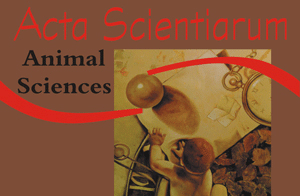ABSTRACT.
This study evaluated the effect of increased energy via supplementation on the performance, ingestive behavior, nutrient digestibility, and nitrogen metabolism of grazing heifers fed tropical forage in the rainy-dry transition season. Treatments consisted of mineral supplementation ad libitum (control) and multiple supplements formulated to provide different energy levels and the same amount of protein (300 g CP animal d-1) and were denominated as low (LE; 340 g TDN animal d-1), medium (ME; 780 g TDN animal d-1) and high (HE; 1220 g TDN animal d-1) energy. Animals supplemented with ME, and HE had a greater average daily gain in relation to the control treatment, with an increase of 41 and 46%, respectively. Greater values for total apparent digestibility of neutral detergent fiber were observed for the treatment HE. Lesser values of urinary urea N were observed for the control and HE treatments. Our results define the use of energy levels in the supplement as a tool for pasture management. If the purpose of the production system is to enhance forage intake, the option is to supply supplements with less energy levels. In contrast, if the purpose is to increase the stocking rate, supplements with greater energy levels should be used.
Keywords:
beef cattle; multiple supplementation; nutritional parameters; tropical pastures

 Thumbnail
Thumbnail
